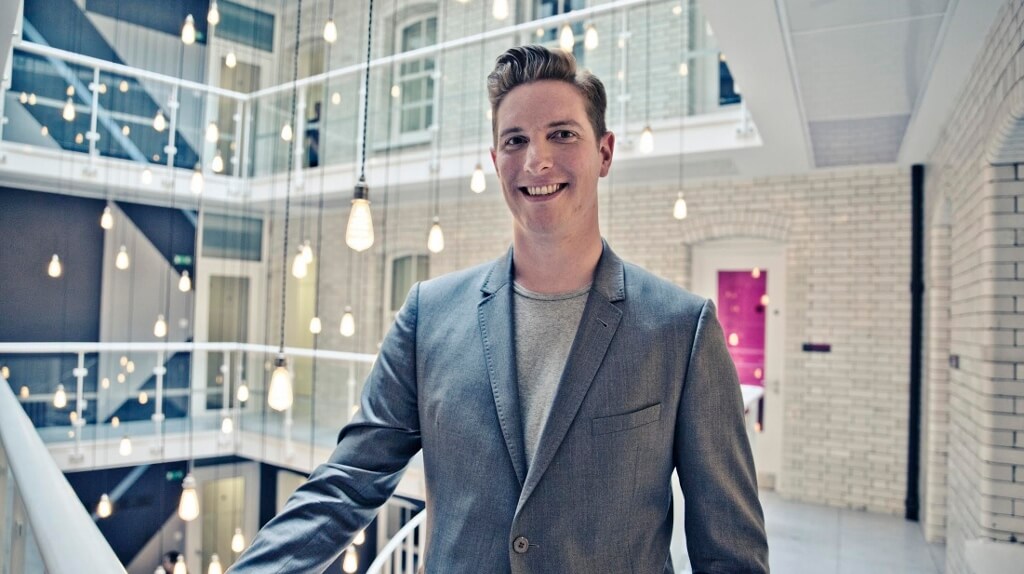Oliver Southern's university experience was the inspiration for Chored, an app that allows house mates to divvy up tasks and pay bills through a shared smartphone app. With investment in the bag, his plans are to scale fast across Europe.
Oliver Southern: Chored
Oliver Southern's university experience was the inspiration for Chored, an app that allows house mates to divvy up tasks and pay bills through a shared smartphone app. With investment in the bag, his plans are to scale fast across Europe.

"Chored is an app for house shares. It lets users split and pay bills (including rent and utilities) directly to the company via the app. As the name suggests, Chored also allows housemates to assign and track household chores.
The app includes group chat and a "who's home" feature which uses geolocation so you can see who's in and who's not. It’s helpful if you forget to push the button on your load of washing – just simply access the app, see who’s home and ask them to push the button for you.
Where did the inspiration come from?
Like most students, I lived in a shared house during university. For the most part, it was a lot of fun but we did have some arguments such as who had left out week-old dirty dishes (usually me). When I moved into a shared property after university, I noticed that arguments over chores and bills worsened.
The thing that struck me was the imbalanced ‘responsibility quota’ – one person was always left to manage all the bills and left to chase people for owed money (this was me, if you hadn’t guessed!). I realised that the relationship between housemates and the way it was managed, was very dysfunctional, and I started thinking about different ways to solve this.
The first lightbulb moment I had was to create a living and cleaning rota in an app format – as a lot of arguments were over minor or trivial chores and cleaning issues. I then thought of integrating a payment platform, so there would be no more disagreements over payments not being made on time, or people being owed money from housemates. The idea of Chored was born.
What makes Chored different from other task-management apps?
Chored fully integrates mobile payments functionality, a messaging platform and task-management capability. Chored allows users to combine all the necessities of house share admin into one simple app. No more passive aggressive notes on the fridge reminding people to clean the dishes, and no more chasing housemates for bills.
How did you develop the app?
In regards to design, I’ve always loved app design but didn’t have the budget to hire a designer at first. The solution? I downloaded Balsamiq and taught myself, creating some mock-ups in the initial stages of the business. Fast forward two years and I’m wholly responsible for our app design on both iOS and Android. Not bad for an ex-lawyer turned excel monkey. I’m still learning, and I hope that never ends.
From a technical perspective, our CTO Melvin Wijenayaka has the full iOS stack covered, and he is responsible for actual app development. He was also responsible for the initial MVP which we used to secure early investment. But our app is contingent on everyone in the house joining in, so we knew we had to provide an android solution too.
The funding allowed Melvin to take a step back from development and don the hat of product owner, leading a team of offshore developers. In the end, they delivered a solution that was featured by Apple, and we have since had over 44k views on the app store, so we’re pretty happy with the setup.
What are your growth plans?
I truly believe in my company and the market we serve. House prices aren’t going any direction but upwards, and the recent trend towards more people sharing houses or flats isn’t going to dissipate. Right now, we have a fantastic product, live on two platforms that our users love – whether it’s chore rotation or bill payments.
A huge part of our 2016 strategy is to bring the experience to a wider audience. We recently hit a £0.42 CPA on a couple of social campaigns, which is encouraging. We know that we can get considerable bang for our marketing buck which is pleasing.
We know that scale is nothing if no one wants your product, so we are constantly looking at ways to improve the user experience. We’ve got a few ideas on how we can evolve the app which are in development at the moment. I’d love for Chored to be front and centre in the house share market, with me alongside it.
What was the process of securing investment?
To date, the business has secured £150k in funding to launch the product, achieved by crowd funding, angel investors and the Startup Funding Club. We have a wealth of advisory talent which has been built up through networking in the right places. Surrounding ourselves with good generals has enabled us to find solutions to challenges quickly and prepared us for what lies ahead.
We are currently in the middle of our second raise – we are looking for £800k essentially to scale fast, first in the UK and then into Europe.
Unlike other offerings on the market, having already integrated a payment solution means that our product is already monetising, and the pure development costs associated with that monumental effort are behind us. People that know about Chored, love Chored. Our job now is simply to get the message out.
What is the involvement of investors in the business and is it a smooth transition?
Including myself and Melvin, we have two additional board members, who were investors involved in our first round. They both hold senior positions at top investment firms, and without their continued counsel and support, our current round definitely wouldn’t be going as smoothly as it is.
The fact remains that despite my experience in commercial finance, this is my first venture into the world of startups and fund raising. Having these investors on our board has sharpened our focus to understand the strength of our business proposition when speaking to potential investors. Their advice has been absolutely invaluable.
What is your best tip for someone seeking seed investment for their business?
Firstly, do not underestimate how difficult raising money is. This is especially true of the first investment – no one likes to be the first to make that leap of faith.
That said, aim low at first. Smaller investments attract larger investments, so as long as you have the energy to keep the round open for a while, it could even be worth starting your journey with a small crowd funding target. This is exactly what we did; we raised £20k with Crowd2Fund, then four months later we closed the round with £150k.
Oh, and never give up. Belief is an incredibly powerful commodity, and essentially one you alone control.
What made you leave good jobs at respected tech companies to start your own business?
It has always been a dream of mine. One of my favourite aspects about running my own business is the autonomy of it; I know exactly what I’m doing and am across all the detail. Working in a large company, you can feel like you are a small part in a massive machine.
Running a startup is the complete opposite – everything that happens is because of something you did, or didn’t do. Suddenly you’re the machine. It means that you can take credit for the good decisions, and shoulder responsibility for the bad ones. So far, I’d say the good are outweighing the bad.
What one thing do you regret doing and how can other start-ups avoid doing it?
Test your assumptions. Never ever assume that you have successfully predicted exactly how your product will be received, and essentially the way it will be used. Spend as much time with your target audience as possible, watching user behaviour and learning which questions you need to ask to influence your development roadmap.
In the two and a half months since we launched on iOS, our numbers have swollen in their thousands, and I have taken a solemn vow not to spend a single penny on assumption-led development. We have a huge amount of data that helps us understand our users and their needs.
When Melvin suggests making a change to the app, I ask for evidence to support the change. If it doesn’t exist, then it doesn’t happen. It’s that simple."
Thanks for signing up to Minutehack alerts.
Brilliant editorials heading your way soon.
Okay, Thanks!


